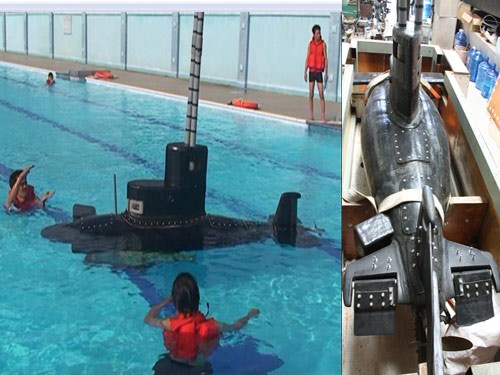VietNamNet Bridge – More and more Vietnamese, from businessmen to engineers, farmers to students, are devoting time and money to creating mini-submarines.
 Do Thai Binh, a renowned maritime expert, said a group of students from HCM City University of Technology has tested an ROV (remotely operated vehicle), a robot submarine that is tethered to a ship, where "pilots" control its movement and actions.
Do Thai Binh, a renowned maritime expert, said a group of students from HCM City University of Technology has tested an ROV (remotely operated vehicle), a robot submarine that is tethered to a ship, where "pilots" control its movement and actions.
Binh declined to give detailed information about the ROV before the students can be sure of the test success. He also said that the path to an unmanned sub like Tianjin that China has launched into the East Sea is still thorny.
However, he said only if Vietnamese begin their navigation will they be able to reach their destination; in other words,if they do not try, they will never get success.
Binh’s sources said that another school in HCM City has also started its research work on marine science, planning to launch its ROV in “the near future”.
More and more Vietnamese have devoted themselves to creating diving devices, submarines and mini-submarines over the last two years.
In the north, the Truong Sa submarine invented by Nguyen Quoc Hoa, an engineer and businessman in Thai Binh province, has caught the special attention from the public. he said he hoped to develop it into a submarine with military capability.
Truong Sa is equipped with an air independent propulsion (AIP), described as a technology breakthrough in the submarine manufacturing industry.
In the south, the Yet Kieu submarine invented by Phan Boi Tran has been put into commercial development. Some consignments of Yet Kieu subs have been exported to Malaysia.
In the central region, Hoang Sa,an unmanned mini sub invented by Le Nga has been successfully tested and introduced to the public. Nga said he is planning an ambitious development plan with the submarine version.
In late 2014, a group of engineers successfully tested a diving vessel named Hoa Binh as witnessed by Minister of Science and Technology Nguyen Quan.
Binh said though the inventions are not perfect, their appearance has prompted management agencies to rethink the development of marine sciences and sea-borne economy.
He noted that Vietnam has more than 3,000 kilometers of coastline.
Hoang Hung, deputy chair and secretary general of the Vietnam Shipbuilding Industry Science Association, said that it was now the right time for Vietnam to think of making the most of people’s abilities to develop a sea-borne science economy.
Hung said that his association is discussing measures to create a playing field for Vietnamese submarine inventors in 2015.

Binh declined to give detailed information about the ROV before the students can be sure of the test success. He also said that the path to an unmanned sub like Tianjin that China has launched into the East Sea is still thorny.
However, he said only if Vietnamese begin their navigation will they be able to reach their destination; in other words,if they do not try, they will never get success.
Binh’s sources said that another school in HCM City has also started its research work on marine science, planning to launch its ROV in “the near future”.
More and more Vietnamese have devoted themselves to creating diving devices, submarines and mini-submarines over the last two years.
In the north, the Truong Sa submarine invented by Nguyen Quoc Hoa, an engineer and businessman in Thai Binh province, has caught the special attention from the public. he said he hoped to develop it into a submarine with military capability.
Truong Sa is equipped with an air independent propulsion (AIP), described as a technology breakthrough in the submarine manufacturing industry.
In the south, the Yet Kieu submarine invented by Phan Boi Tran has been put into commercial development. Some consignments of Yet Kieu subs have been exported to Malaysia.
In the central region, Hoang Sa,an unmanned mini sub invented by Le Nga has been successfully tested and introduced to the public. Nga said he is planning an ambitious development plan with the submarine version.
In late 2014, a group of engineers successfully tested a diving vessel named Hoa Binh as witnessed by Minister of Science and Technology Nguyen Quan.
Binh said though the inventions are not perfect, their appearance has prompted management agencies to rethink the development of marine sciences and sea-borne economy.
He noted that Vietnam has more than 3,000 kilometers of coastline.
Hoang Hung, deputy chair and secretary general of the Vietnam Shipbuilding Industry Science Association, said that it was now the right time for Vietnam to think of making the most of people’s abilities to develop a sea-borne science economy.
Hung said that his association is discussing measures to create a playing field for Vietnamese submarine inventors in 2015.


No comments:
Post a Comment